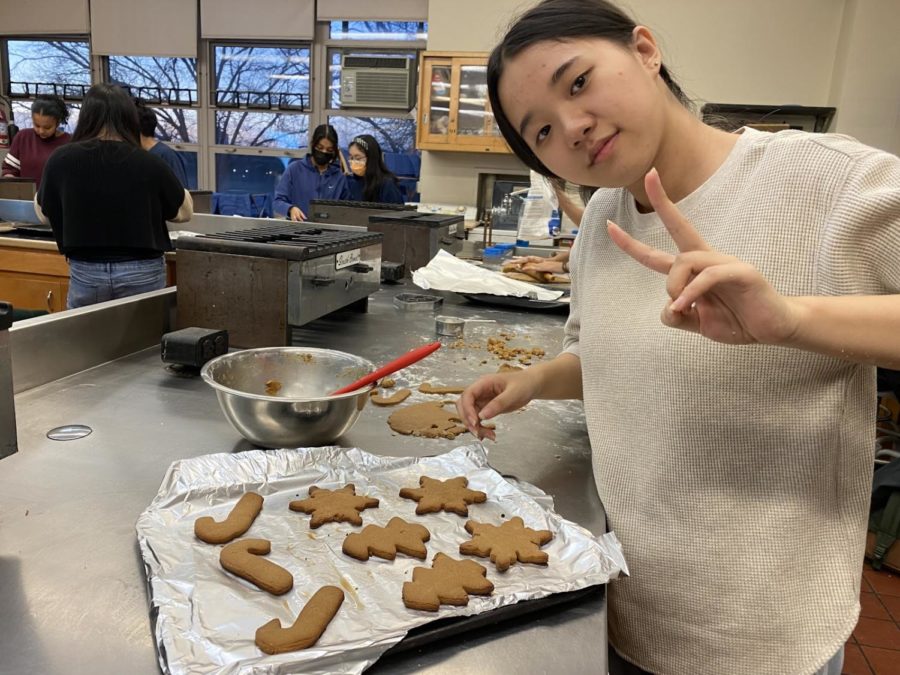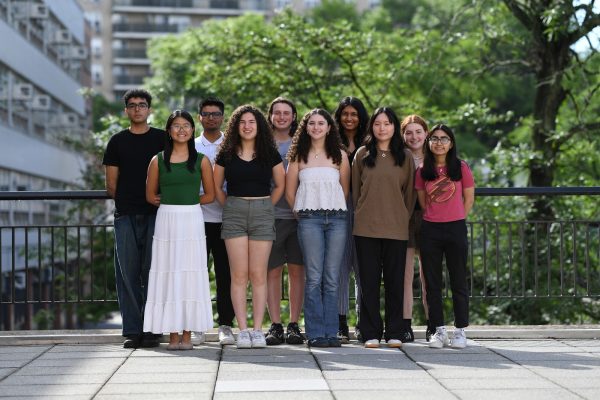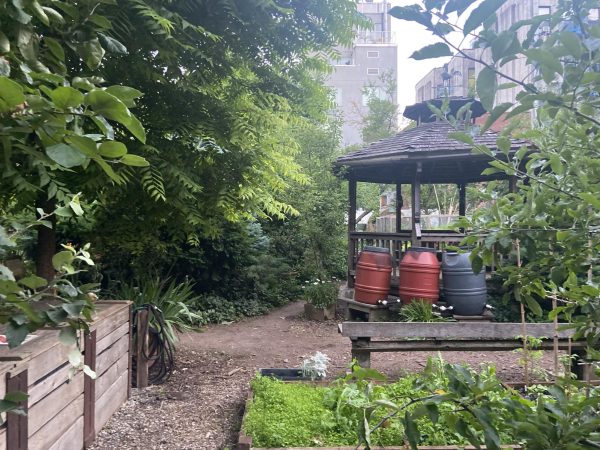A Sweet (and Savory) Way to End Your School Day
Whether sweet or savory, everyone loves baked goods. But what makes Bronx Science’s Baking Club such a big hit?
Baking club lets students let go of stress- and perfectionism. Anika Hong ‘24, says that even if her baked goods don’t turn out perfectly, she enjoys the process.
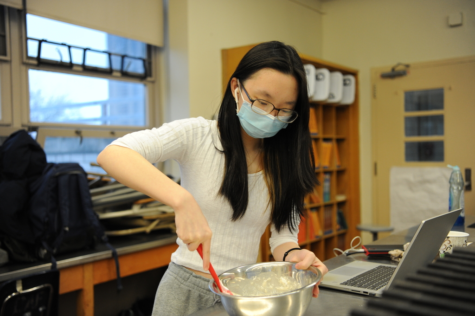
Bronx Science is filled with scores of clubs and organizations, one hundred and three to be exact, but there is one specific club that stands out from the rest: Baking Club.
Every Saturday, around 2:45 p.m., the Baking Club board, consisting of president Emily Hsieh ’24, vice president Elisa Chang ’24, secretary Janine Choy ’24, and treasurer Alex Chen ’24, sends out a google sheets form for excited club members to fill out. The early bird always gets the worm, as only twenty four members out of the club’s hundreds, are able to attend each in person club meeting at Bronx Science. Within seconds, all the slots are filled.
History of Desserts
Sweets, whether baked or not, have been loved for centuries, dating back to as early as 2600 B.C. in Egypt.
Originally, sweets were mainly fruit-based, a combination of honey and nuts, and fruits, such as figs and dates. The ancient Egyptians enjoyed sweetened fruits and honey, and even had a god of sweetness known as “Renenutet.”
The mouth-watering treats quickly spread throughout the ancient world, becoming popular in other civilizations such as ancient Greece, where honey cakes and pastries were commonly consumed, and in ancient Rome, where sugar was a luxury item primarily used in the making of candies and sweet syrups.
However, even then, they were not considered “food” of their own, but merely a palate cleanser.
Yet, as time passed, the horizon expanded, opening up to a variety of other desserts, such as gingerbread, originally created in the 1400s.
The 1600s were a major turning point for the consumption of deserts. Sugar prices decreased rapidly due to the abundant sugar plantations in the New World. More people were able to afford and consume sugar regularly. The dessert industry expanded rapidly as people began to think of new and creative ways to use sugar in their baking.
As a result of this, dessert cookbooks sales began to increase. These cookbooks were filled with recipes for cakes, pastries, candies, and other sweet treats. Many of these recipes were simple, allowing people of all skill levels to bake and enjoy sweets in their homes.
Across cultures and centuries, sweets and baked goods have been associated with joy, holidays, and gathering with family and friends. The Bronx science baking club continues this centuries-long tradition of enjoying community through cooking.
What started your love for baking?
Emily Hsieh ’24 said, “As a child, I was generally left unattended, which led to long periods of time spent on the internet. Online, I would spend hours watching people bake, learning various recipes, and researching pastry-making techniques; however, I was never able to apply this information because my family wasn’t financially well-off at the time and we subsequently did not own an oven. When we finally moved to an apartment with an oven, I started baking every chance I got.”
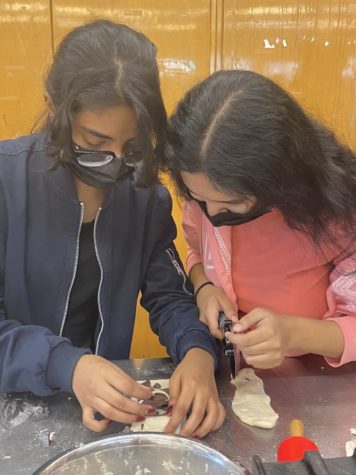
Lillian Gao ’25 said, “I do bake in my free time because I enjoy food, and I enjoy feeding people. The chaotic quality of baking with someone else always makes baking that much more enjoyable. The final product is rewarding, and my family definitely enjoys the final product, more so than the cleaning that needs to be done afterward.”
Kina Nagasaki ’26 loves “how [baking] takes your mind off everything else and makes you focus on one thing.”
Raisa Kamal ’24 remembers watching baking videos since she was young. “I remember going on YouTube and watching Tasty videos, saving the videos for when I do bake in the future,” she said. When I asked her why she hasn’t started baking yet, she replied, “I am so busy nowadays. If I don’t have this to do, then I have that,” she said. She explained that she has a lot of responsibilities, such as schoolwork and extracurricular activities, which take up most of her time. Despite this, Kamal still tries to attend the baking club as often as she can, and looks forward to attending more meetings.
Why join the Baking Club?
Being able to eat is a strong motivating factor for many. Janine Choy ’24 said, “The most fun about baking is the end product, as I love being able to eat my creations afterward. It’s the most satisfying part for me, at least.”
Others may feel a sense of accomplishment. “I find making the food look visually aesthetic the most fun. I believe that visuals of a food is as important as its taste, so being able to spend a lot of effort and seeing it pay off into a good looking product is satisfying to me,” said Ayshi Sen ’24.
As the saying goes, it is not the ending that matters, but the journey along the way. Others believe that baking is a way to relieve the built up stress from school. Eyenain Misgar ’23 agrees, stating that Baking Club is, “ leisurely activity to balance out schoolwork and chance to bake and bring home treats.” Being able to relax and eat baked goods is not the only thing contributing to the joy of baking. Misgar continued, “It’s like chemistry, but edible. I think the funniest part is trying to guess what would happen if I wander off the recipe a bit and experiment with different methods of baking and ingredients.”
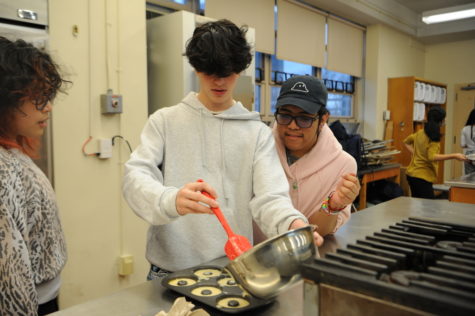
As the president of the Baking Club, Hsieh believes that baking is a way for her to do things freely, instead of sticking to a tight, rigid schedule. She said, “I bake because it helps me feel more in-control in a healthy way. I know that certain ingredients, techniques, et cetera will produce certain outcomes and that I can manipulate any variable to change the resultant. It’s a reliable means of letting my brain feel a semblance of security.”
Sophia Guo ’26 agrees, stating, “I find the decoration part the most fun because I can get creative with it and there’s not a recipe that I have to follow.”
Regardless of the reason for joining, baking is a comfort for anyone, allowing individuals to relax, unwind, and have fun. Whether you are an experienced baker or a beginner, the process of measuring ingredients, mixing them together, and watching your creation come to life in the oven can be incredibly satisfying.
Regardless of the variety of different reasons as to why people initially joined Baking Club, its members are in it for the long run.

How to join the Baking Club?
Email Emily Hsieh at [email protected], or Janine Choy at [email protected], or Alex Chen at [email protected], or Elisa Chang [email protected].
Don’t forget to follow Baking Club’s official instagram page @bxscibakingclub for weekly meeting updates.
Tiffany Wang is a Managing Editor and Advisory Editor for ‘The Science Survey.’ As an avid fan of stories, whether they are nonfiction or fiction,...

